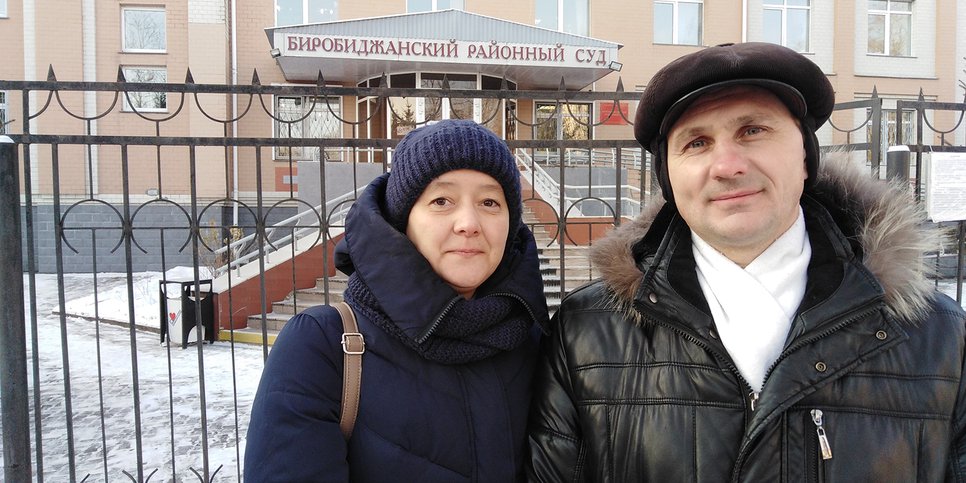In the photo: Evgeny Golik with his wife. Birobidzhan, January 20, 2021.
In the photo: Evgeny Golik with his wife. Birobidzhan, January 20, 2021.
Yevgeniy Golik, 44, of Birobidzhan was convicted for his faith. He received a two-and-half year suspended sentence
Jewish Autonomous AreaOn January 20, 2021 Olga Klyuchikova, judge of the Birobidzhan district court of the Jewish Autonomous Region, sentenced Yevgeny Golik under part 2 of Article 282.2 of the Criminal Code (participation in the activities of an extremist association): 2.5 years of suspended sentence with a probation period of 3 years and restriction of freedom for 1 year.
The state prosecutor requested that he be sentenced to 4 years in a penal colony. There were no victims in the case. The believer pleaded not guilty and asked for a full acquittal. The verdict did not come into force.
"I am against extremism, violence and brutality. I have never felt hatred towards people and have never encouraged anyone to do so. All my actions were presented on video. I studied the Bible with the perpetrators, and this was not prohibited by the Supreme Court of the Russian Federation," Golik said in the defendant's last statement.
Before becoming a Jehovah's Witness, Yevgeniy Golik served in the army in Chechnya and has state awards for participation in combat operations. After becoming acquainted with the Bible, he got rid of drug addiction.
For almost a year and a half, he has been under house arrest, which limits his freedom of movement. It all began in May 2018, when an FSB special operation with the participation of 150 law enforcement officers, code-named "Judgment Day," took place against local Jehovah's Witnesses in the city of Birobidzhan. As a result, 19 criminal cases were opened against 22 believers. On July 30, 2019, a criminal case was opened against Yevgeniy Golik. His case was investigated by the Investigative Department of the Federal Security Service of Russia in the Jewish Autonomous Region. The investigation went on for about five months, and on December 23, 2019, the materials were transferred to court. The trial lasted 13 months.
During the appearance in court, a witness for the prosecution, a police officer, was unable to explain what exactly the "crime" of Yevgeniy Golik consisted in. She only referred to the fact that the townspeople were unhappy with the defendant's religion. They didn't hear any extremist slogans from the believers. Believers gathered to pray and discuss the Bible with co-religionists, which the security forces considered a threat to state security and the constitutional order. The entire logic of the accusation was based on the speculative thesis that belief in God is "an extension of the activity of an extremist organization. As a consequence of this approach, instead of searching for and proving the guilt of the defendants, the prosecutor's office was busy "proving" that they practiced a particular religion, even though no religion is banned in Russia. Having "proved" the defendants' confession, which they had never concealed, the investigation suggested that this fact should be automatically interpreted as the activities of a banned legal entity. The absurdity of this logic did not embarrass the court, and it equated peaceful believers with dangerous criminals.
The conviction of Yevgeniy Golik was the first in the Jewish Autonomous Region. In January 2021 several more sentences for believers in this region are scheduled to be announced. Yevgeniy Golik became the 60th resident of modern Russia to be convicted of believing in God after the Russian Supreme Court liquidated the Administrative Center of Jehovah's Witnesses in Russia and 395 local religious organizations.
Russian and foreign figures and organizations unanimously condemn the persecution of Jehovah's Witnesses in Russia. These include the RF Commissioner for Human Rights, the RF Presidential Human Rights Council, the RF President, prominent Russian public figures, the European Union External Action Service, observers of the Parliamentary Assembly of the Council of Europe, the UN Working Group on Arbitrary Detention, and the Office of the UN High Commissioner for Human Rights. The Russian government has repeatedly stated that decisions of Russian courts to liquidate and ban Jehovah's Witnesses organizations "do not assess the doctrine of Jehovah's Witnesses and do not contain restrictions or bans on the individual practice of the above-mentioned doctrine.

